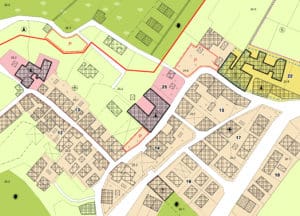Owning a small business is hard work. Not only do you have to manage the day-to-day operation, but you must also be proficient in everything from employment laws to community networking. One area that many business people struggle with is navigating zoning laws. Zoning laws or ordinances are rules within your city or county that regulate how you can use a parcel of land and how buildings must be constructed. By understanding zoning laws for small businesses, you can make better decisions for your company.
 Determine the zone for a section of land.
Determine the zone for a section of land.
Whether you’re searching for a prospective new location or trying to figure out what you can do with the property you already own, the first step is to determine the general zoning codes for the parcel of land. You can travel to your local municipal planning department in person, or many cities now provide zoning maps online. For example, Jackson County, Oregon’s Bureau of Land Management department publishes an online map in addition to online resources to help the community easily access information about zone districts and land use regulations.
Understand what zones allow and restrict.
Definitions and allowable uses for zones will vary from one municipality to another; however, the following descriptions apply to many codes across the United States. Check with your local municipality for specific rules in your area.
- Residential. These zones are set aside for residential homes. Often there are further zoning restrictions indicating if homes must be single-family dwellings or if multi-family units and apartment structures are allowed. Sometimes cities allow small businesses to be operated from a residential zone, while others forbid it.
- Commercial. These zones are for business operations such as offices, restaurants, and retail locations. In some cases, residences may be mixed with commercial structures such as apartment units over retail businesses.
- Industrial. Operations with higher noise levels, greater traffic, and potential waste or other risks are allowed in industrial zones. Examples include manufacturing facilities, warehouses, and chemical production units. There are often further classifications describing the extent of operations allowed in a particular zone.
- Agricultural. Agricultural zones are for farming. Sometimes homes may be interspersed, but there may be restrictions on the amount of non-farming structures on a parcel of property.
- Historical. Historic districts are protected zones of communities with rules limiting renovations to preserve the original style and feel of the area. Historic districts can be commercial or residential and generally have buildings over 50 years old. If a property is within a historic district, you may have to obtain permission from a designated committee to make any structural or visual changes to your structure.
Be aware of what the zones may include.
If you haven’t operated a business before, you may not know all the details that could be regulated in your municipality’s zoning regulations. Here are just a few examples of code regulations that catch new business owners off guard:
- Parking lot specifications. Many zoning regulations now restrict how many parking spaces a business can provide based on the occupancy of the space. Parking lot construction must also meet specifications, from constructing proper drainage to limiting the height of lamp posts and requiring ADA parking spaces.
- Setbacks. Setbacks regulate where a building can be placed in relation to the property border. For commercial structures, this may require a building to be constructed closer to the street with parking in the back or vice-versa. Setbacks may also limit where additional facilities like worksheds or storage units can be situated on the property.
- Landscaping. Some municipalities now require commercial businesses to create minimum areas with landscaping, green space, or trees. These rules are generally intended to create a uniform aesthetic appeal within a location.
- Signage. Business owners will usually face signage requirements from two aspects–municipal codes and owners of leased spaces. Signage regulations can limit the size, placement, and style of signs and advertising on the exterior of a building or its property.
- Type of business allowed. Some municipalities are very specific about the types of businesses permitted or forbidden in a commercial zone. For example, liquor stores, bars, and adult entertainment establishments are often restricted from certain community areas.
Partner with a professional to best understand the basics of zoning laws for small businesses.
The good news is, you don’t have to go it alone. Small business owners can get all the assistance they need with a professional partner like Richard Stevens & Associates. We are experts on land use planning regulations in Oregon and can help you understand all the details impacting your current or potential property. We assist our clients with all work related to rural and urban land use planning permits and zoning laws. Our team will work to understand your needs and help you understand the legal requirements to achieve your goals.

 Determine the zone for a section of land.
Determine the zone for a section of land.